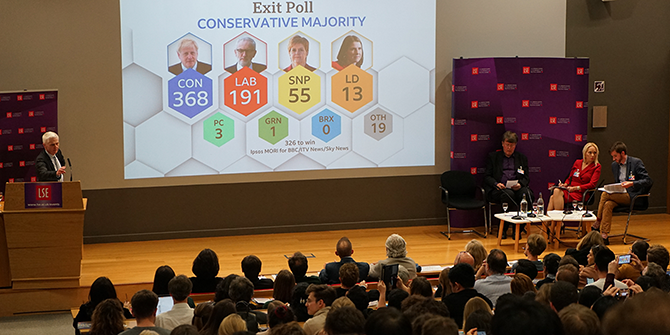With a UK General Election set for July 4, our experts give their analysis and reflections on the campaign ahead.
 “Brutally adversarial, occasionally chaotic, and mercifully short”
“Brutally adversarial, occasionally chaotic, and mercifully short”
The starting pistol for this election race was fired on 22 May and it will end just six weeks later. By contrast, The US presidential election process started back in mid-January and will end with an inauguration in January 2025.
The money spent on UK elections is also strictly limited. As a result, politicians often resort to ‘retro’ campaigning methods involving battle-buses, soap boxes and stilted party-political broadcasts. While mainstream broadcasters are required to achieve political ‘balance’, the on-line election is not. Spending on digital campaigning is effectively impossible to limit.
Compared to the past, party leaders avoid public meetings (and thus hecklers) and appear at choreographed events surrounded by hand-picked party members. A change has contributed to the ‘presidentialization’ of the role of prime minister.
On election night, when the finishing line is in sight and discussions of vote ‘swing’ rumble through TV studios and vote counts across the country, it will be worth noting the work of the LSE’s Robert Mckenzie. Professor Mckenzie famously who took part in BBC election night programmes from 1955 to 1979, and popularised, along with the great David Butler, the ‘Swingometer’, which even today plays a key part in understanding the dynamics of electoral change.
Tony Travers is Professor in Practice in LSE Department of Government, Associate Dean of the LSE School of Public Policy and Director of LSE London. His key research interests include local and regional government, elections and public service reform.
 “The divisions created by Brexit still run deep”
“The divisions created by Brexit still run deep”
If the 2019 general election was the “Get Brexit Done” election, this one will likely be a return to “It’s the economy, stupid”. For most of the eight years after Britain voted to leave the EU, Brexit was the main topic of political conversation among both voters and political elites. Yet, that is no longer the case. Instead, it seems that the main parties are actively avoiding the topic of Brexit, and voters have shifted back to the bread and butter of politics: the economy and public services, as well as immigration.
Yet, while this will not be another Brexit election, it doesn’t mean that Brexit no longer matters. Despite the seeming lower salience of the issue, the deeply held political identities that the EU referendum produced are still with us. Two-thirds of voters still feel attached the Brexit tribes – and more strongly attached than to their partisan affiliations. And this shapes people’s outlook on how well the economy, and the government, have performed. ‘Remainers’ are particularly disillusioned about the state of the economy and the government’s handling of Brexit.
Hence, while the election will primarily be voters’ verdict on the Conservative government’s competence and their ability to deliver on the economy, public services and immigration, the divisions created by the Brexit vote still run deep.
Sara Hobolt is the Sutherland Chair in European Institutions and professor in the LSE Department of Government, and has published extensively on elections, referendums, public opinion and European Union politics.
 “The Conservative party machine does not appear ready for this”
“The Conservative party machine does not appear ready for this”
At this point, anything other than a Labour majority would be a big surprise. That’s partially because Labour’s vote has become much more geographically efficient under Starmer’s leadership. That means Labour are leading in more seats across Britain, instead of piling up votes in constituencies like Camberwell and Peckham, where I live and which they should still win very comfortably. British politics has been volatile over the past years and we have seen big changes during campaign periods, but there is little in the first days of campaigning that would point to a turn-around for the Conservatives.
As someone who studies election campaigns, what I am looking for in the first days of campaigning is for the element of visible unpreparedness that this election date induces into campaign operations. Certainly campaigners on all sides of this election would have liked more time to do testing on campaign tactics and messaging, as well as on candidate and staff recruitment. At the same time, the Labour campaign seems to me in a decent enough shape, with only a few seats still looking for candidates and a clear, simple campaign message: “Change”.
That’s very different for Reform, who do not seem ready for this election from an organisational point of view, and for the SNP, who would have hoped for some breathing space to recover in the polls from two First Minister resignations. While the first will benefit the Conservatives, the second will benefit Labour. The Greens should be happy to fight this election after their local election heights and will be on the offensive looking to make a few gains.
The Conservative party machine does not appear ready for this, neither when it comes to messaging, nor candidate selection, which says a lot, given that one of the advantages of being able to determine the election date is that you should catch the other side unprepared.
Dr Florian Foos is Associate Professor in Political Behaviour in the LSE Department of Government. His extensive research on political campaigns focuses on the causal effects of formal and informal interactions between citizens, politicians and campaign workers on electoral mobilisation, opinion change and political activism.
 “Who wins the hearts and minds of young voters today will most likely reap the benefits tomorrow”
“Who wins the hearts and minds of young voters today will most likely reap the benefits tomorrow”
While the election result may well seem like a foregone conclusion, there are steps that all parties might want to consider to affect its course. These revolve around tapping into the new defining political cleavage in Britain: age.
The British voting age-gap – whereby young people skew Labour and older people skew Conservative – has become remarkably large in recent elections. At the same time, young adults seem to be reversing the trend of becoming more conservative as they grow older, raising concerns amongst Conservative MPs about what generational replacement could mean for the party’s future.
The answer may lie in renewing appeals to young adults with policies targeting their interests. Results from a survey experiment I ran, indicate that young voters are responsive to policies that target their preferences regardless of partisanship, so the Conservatives may be able to close the youth support-gap with Labour by adopting a youth-focused stance.
This has not happened in fear of alienating older voters, but my experiment results suggest it would not be the case – a finding that is further reflected in recent research on intergenerational hostility we have been undertaking at EPO. Contrary to popular assumptions about growing polarisation between age cohorts, our results suggest that voters are sympathetic towards other generations, and feel misunderstood rather than adverse.
In a context of growing youth disenfranchisement and low turnout, it is therefore paramount for all parties to place more efforts in appealing to young adults. Who wins their hearts and minds today will most likely reap the benefits tomorrow.
Dr Laura Serra is a Postdoctoral Research Officer at the Electoral Psychology Observatory, a research unit within the LSE Department of Government. Laura’s research explores how voters’ characteristics, particularly age, and parties’ programmatic outlooks influence political attitudes and behaviours.


